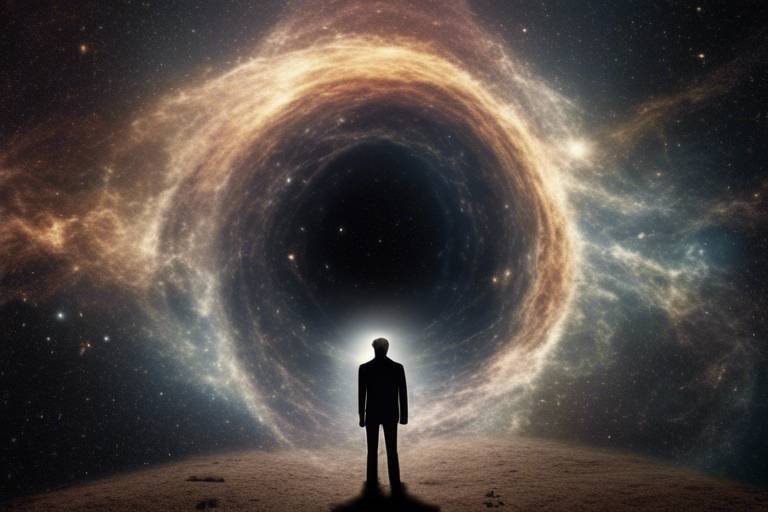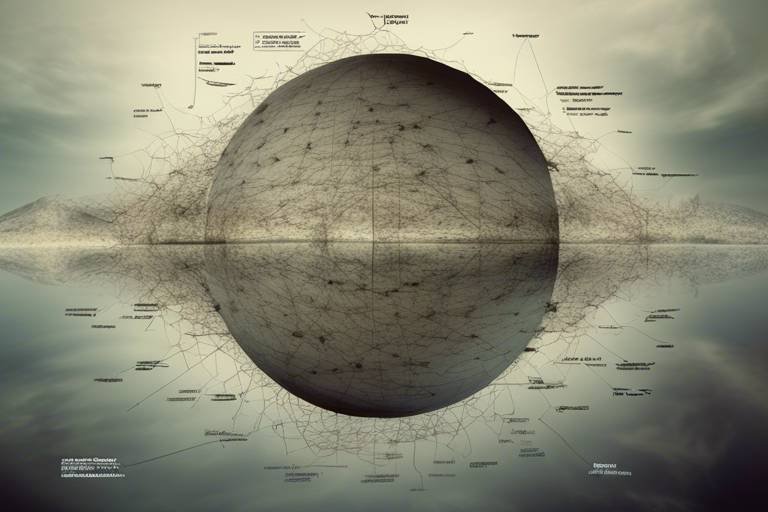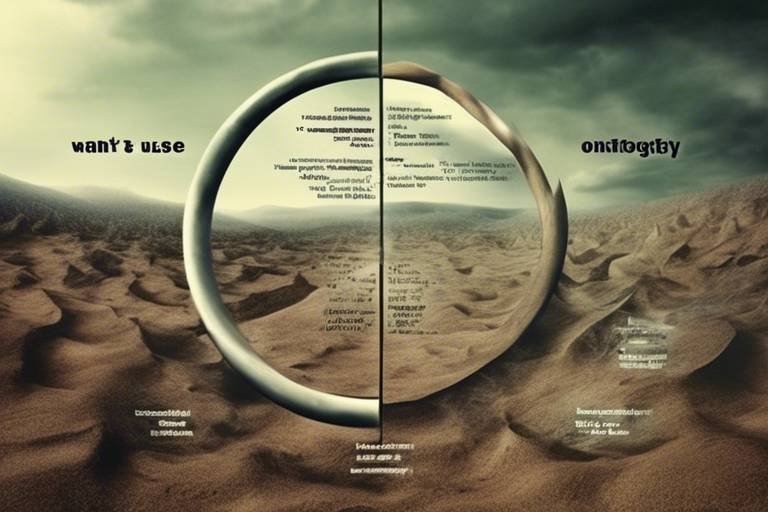Metaphysics: Is Reality Limited By Our Five Senses?
Welcome to the intriguing realm of metaphysics, where we delve into the fundamental questions about existence, reality, and the limits of human perception. Have you ever wondered if what you see, hear, touch, taste, and smell is the entirety of reality? Or could there be more lurking beyond the veil of our senses? This article will explore these profound questions, challenging our understanding of reality and the implications it has for knowledge and existence.
At the heart of metaphysics lies the question: what exactly constitutes reality? Philosophers have grappled with this question for centuries, offering various perspectives on existence. Some argue that reality is merely a construct of our minds, shaped by our experiences and perceptions. Others believe in an objective reality that exists independently of our senses. Imagine reality as a vast ocean; our senses are like small boats navigating its surface. While we may catch glimpses of the depths below, we can never fully comprehend the entirety of the ocean itself.
Our five senses—sight, hearing, touch, taste, and smell—play a crucial role in shaping our understanding of the world. They act as our primary means of interacting with our environment, but do they provide an accurate representation of reality? For instance, consider how a beautiful sunset can evoke feelings of peace and wonder. Yet, that same sunset might be perceived differently by someone experiencing a profound personal loss. Our senses not only inform us but also color our experiences, leading to subjective interpretations of the same reality.
When we talk about perception, we must acknowledge the differences between subjective experiences and objective reality. Our individual experiences can distort our understanding of the world around us. For instance, two people can witness the same event but interpret it in entirely different ways based on their backgrounds, emotions, and beliefs. This divergence raises the question: if reality is shaped by our perceptions, can we ever truly know what is real?
Diving deeper, we encounter various philosophical theories regarding perception. Empiricism posits that knowledge comes primarily from sensory experience, suggesting that what we perceive is all that exists. In contrast, rationalism argues that reason and innate knowledge play a significant role in understanding reality, independent of sensory input. These perspectives influence how we interpret our experiences and the nature of reality itself. It's like trying to solve a puzzle; depending on whether you focus on the pieces in front of you or the picture on the box, your understanding will differ.
Despite their importance, our senses have inherent limitations. For example, humans can only see a fraction of the electromagnetic spectrum, meaning countless phenomena exist beyond our visual perception. Similarly, our hearing is limited to a specific range of frequencies. These constraints suggest that our awareness of broader realities may be significantly restricted. Imagine trying to listen to a symphony with your ears plugged; you might catch a few notes, but the full experience would elude you.
The implications of these metaphysical theories extend to our understanding of existence, consciousness, and the universe itself. If our senses limit our perception, what does that mean for our grasp of consciousness? Are there aspects of existence that remain hidden, only to be discovered through exploration beyond the conventional sensory experience? This opens the door to fascinating discussions about the nature of reality and our place within it.
As we venture further, we encounter alternative frameworks that challenge traditional sensory-based understandings of reality. These perspectives include intuition, reason, and even non-ordinary states of consciousness. Each offers a unique lens through which to view existence, suggesting that reality may be far more complex than our senses can convey.
Intuition often provides insights that transcend our immediate sensory experiences. Have you ever had a gut feeling about something that turned out to be true? Such instances suggest that our understanding of reality can extend beyond what we can see or hear. Intuition acts as a bridge to deeper knowledge, allowing us to tap into truths that sensory perception alone may miss. It's like having a sixth sense that guides us through the fog of uncertainty.
Advancements in science, particularly in fields like quantum physics and neuroscience, challenge our conventional views of reality. Quantum physics introduces concepts that defy our understanding of space and time, suggesting that particles can exist in multiple states simultaneously. Meanwhile, neuroscience explores how our brain processes sensory information, revealing that what we perceive is not always an accurate reflection of external reality. These scientific insights encourage us to reconsider the limitations of our senses and the nature of existence itself.
- What is metaphysics? Metaphysics is a branch of philosophy that explores the fundamental nature of reality, existence, and the relationship between mind and matter.
- How do our senses limit our understanding of reality? Our senses can only perceive a fraction of the universe, leading to a subjective interpretation of reality that may not encompass the whole truth.
- Can intuition provide insights beyond sensory perception? Yes, intuition can offer knowledge and insights that transcend what we can observe through our senses.
- What role does science play in understanding reality? Scientific advancements challenge traditional views and reveal complexities in reality that our senses alone cannot explain.

The Nature of Reality
When we ponder the concept of reality, we often find ourselves at a crossroads of thought, teetering between what we perceive and what truly exists. Reality is not merely a collection of physical objects and events; it encompasses a vast array of experiences and interpretations that shape our understanding of the universe. Philosophers have long debated the essence of reality, questioning whether it is an objective state of being or a subjective experience shaped by our personal perceptions.
At its core, reality can be seen as a complex tapestry woven from the threads of existence, perception, and consciousness. Imagine standing in a room filled with vibrant colors, sounds, and textures. Each person in that room experiences it uniquely—some may be drawn to the vivid hues, while others may focus on the sounds of laughter. This divergence leads us to an essential inquiry: is reality a singular entity, or does it shift and change based on our individual perspectives?
Philosophical perspectives on reality often fall into two broad categories: realism and idealism. Realists argue that reality exists independently of our perceptions, suggesting that there is an objective world that we can understand through observation and reasoning. In contrast, idealists contend that reality is fundamentally shaped by our consciousness and experiences, implying that our perceptions are the very fabric of reality itself. This dichotomy raises intriguing questions about the nature of existence and our place within it.
To further unravel the nature of reality, we can consider the following aspects:
- Existence: What does it mean to exist? Is existence confined to the physical world, or does it extend to ideas, emotions, and consciousness?
- Perception: How do our senses inform our understanding of reality? Are they reliable conduits of information, or do they distort our experiences?
- Consciousness: What role does consciousness play in shaping our reality? Can we experience realities beyond our immediate sensory perceptions?
These questions highlight the intricate relationship between perception and reality, suggesting that our understanding of the universe is often filtered through the lens of our senses. However, this leads us to contemplate the limitations of those senses. For instance, consider the fact that humans can only perceive a small fraction of the electromagnetic spectrum. What lies beyond our sensory capabilities? Are there dimensions or realities that remain hidden from us, waiting to be discovered?
As we delve deeper into the nature of reality, we begin to realize that our understanding is not static; it evolves as we gain new insights and experiences. Theories from various fields—be it philosophy, science, or spirituality—offer unique perspectives that challenge our conventional understanding of existence. In the grand scheme of things, reality may be a vast ocean of possibilities, with our senses serving merely as a small boat navigating its waters.
In conclusion, the nature of reality is a profound and multifaceted concept that invites us to explore beyond the boundaries of our sensory experiences. As we continue to question and investigate, we may uncover new dimensions of existence that expand our understanding of what it truly means to be alive in this universe.

The Role of the Five Senses
The five senses—sight, hearing, touch, taste, and smell—are the gateways through which we experience the world around us. They are like the instruments of a grand orchestra, each playing its part to create a symphony of perception. But have you ever paused to consider how these senses shape our understanding of reality? It's a fascinating thought! Our senses provide us with a continuous stream of information, allowing us to navigate our environment, make decisions, and form connections with others. However, the question remains: do they offer us a complete and accurate representation of reality?
When we look at the world through the lens of our senses, we often assume that what we perceive is the ultimate truth. Yet, this assumption can be misleading. For example, consider how a beautiful painting can appear differently depending on the lighting or your distance from it. Similarly, the taste of food can change based on our mood or even the company we keep. This brings us to a crucial point: our senses can be subjective and may not always align with an objective reality. In essence, our perception is influenced by a myriad of factors, including personal experiences, cultural backgrounds, and even our physical state at any given moment.
Moreover, the limitations of our senses can lead us to miss out on aspects of reality that lie beyond their reach. For instance, we can't see ultraviolet light or hear sounds beyond a certain frequency. This limitation raises an intriguing question: what else exists in the universe that we simply cannot perceive? Are there dimensions, energies, or entities that elude our sensory experience? The idea that our understanding of reality is confined by our sensory perceptions opens up a realm of possibilities that challenges traditional views and invites deeper exploration.
To further illustrate this point, let's take a look at how each sense contributes to our perception:
| Sense | Function | Limitations |
|---|---|---|
| Sight | Allows us to perceive colors, shapes, and movement. | Cannot detect infrared or ultraviolet light. |
| Hearing | Enables us to experience sound and music. | Limited to a specific range of frequencies. |
| Touch | Provides information about texture, temperature, and pressure. | Can be influenced by emotional state or context. |
| Taste | Allows us to enjoy flavors and discern different food qualities. | Can be affected by smell and personal preferences. |
| Smell | Connects us to memories and emotions through scents. | Varies greatly between individuals and can be easily masked. |
In conclusion, while our five senses are invaluable tools for navigating the world, they also come with inherent limitations. They shape our understanding of reality but do not encompass the entirety of existence. This realization invites us to consider alternative ways of knowing and experiencing the world, pushing the boundaries of what we deem possible.
- Can we trust our senses completely? While our senses provide valuable information, they can be subjective and influenced by various factors, making them unreliable at times.
- Are there realities beyond our senses? Yes, many aspects of reality, such as certain wavelengths of light or sound, exist beyond our sensory capabilities.
- How can we expand our understanding of reality? Exploring philosophical theories, scientific advancements, and non-ordinary states of consciousness can help broaden our perception of reality.

Perception vs. Reality
When we talk about perception and reality, we're diving into a fascinating realm where our senses and our understanding of the universe often clash. Imagine you're at a concert, feeling the bass thumping in your chest, surrounded by vibrant lights and the energy of the crowd. This experience is undeniably real to you, yet it is filtered through your senses, which can be both a gift and a limitation. Our five senses—sight, hearing, touch, taste, and smell—paint a vivid picture of the world, but they also create a subjective reality that may not reflect the objective truth.
Consider this: two people can witness the same event but walk away with completely different interpretations. One might see a heated argument as a passionate discussion, while another perceives it as a conflict. This discrepancy highlights a crucial point: our individual experiences, shaped by personal biases and emotions, can distort our understanding of what is actually happening. It's almost like wearing tinted glasses; the world appears different based on the color of the lenses you choose.
Philosophers have long debated the differences between subjective perception and objective reality. For instance, the theory of empiricism posits that knowledge comes primarily from sensory experience. However, this raises an intriguing question: if our senses can mislead us, can we truly trust them to provide an accurate representation of reality? On the flip side, rationalism argues that reason and intellect are the primary sources of knowledge, suggesting that there are truths beyond what we can perceive. This philosophical tug-of-war invites us to explore the limitations of our sensory experiences.
To further illustrate this point, let’s look at a simple table comparing perception and reality:
| Aspect | Perception | Reality |
|---|---|---|
| Definition | How we interpret sensory information | What actually exists independent of our interpretation |
| Subjectivity | Highly subjective, varies from person to person | Objective, remains constant regardless of individual beliefs |
| Influencing Factors | Emotions, prior experiences, cultural background | Scientific laws, physical properties, universal truths |
As we navigate through life, we encounter countless situations where our perceptions may lead us astray. For example, optical illusions can trick our eyes into seeing something that isn’t there, demonstrating that what we perceive can be misleading. This phenomenon serves as a reminder that our senses, while incredibly powerful, have inherent limitations. They can't capture the full spectrum of reality, much like a camera that can only photograph a scene in two dimensions, missing out on the depth and richness of the experience.
Ultimately, understanding the distinction between perception and reality is crucial for our intellectual growth. It encourages us to question our assumptions and seek deeper truths. By acknowledging that our sensory experiences are just one piece of the puzzle, we open ourselves up to a broader understanding of existence. This journey invites us to explore not only what we see but also what lies beyond the veil of our immediate perceptions. So, the next time you find yourself in a situation where your perception feels absolute, take a moment to pause and ask: What else could be true?
- What is the difference between perception and reality?
Perception is how we interpret sensory information, while reality is the objective truth that exists independent of our interpretation.
- Can our senses deceive us?
Yes, our senses can be influenced by emotions, experiences, and external factors, leading to misinterpretations of reality.
- How can we gain a better understanding of reality?
By questioning our assumptions, seeking knowledge beyond sensory experience, and considering multiple perspectives, we can expand our understanding of reality.

Philosophical Perspectives
When we dive into the realm of , we uncover a rich tapestry of thought that has shaped our understanding of reality for centuries. Two major schools of thought dominate this landscape: empiricism and rationalism. Each offers a unique lens through which we can examine the relationship between our senses and the world around us.
Empiricism posits that knowledge comes primarily from sensory experience. Think of it like a painter who relies on the colors and textures they can see and touch to create a masterpiece. Empiricists argue that our understanding of reality is rooted in what we can observe and measure. This perspective emphasizes the importance of evidence and experimentation, suggesting that our senses are not just tools but the very foundation of our knowledge. However, this reliance on sensory data raises a critical question: Are our senses always reliable?
On the flip side, we have rationalism, which champions the idea that reason and logic are the primary sources of knowledge. Imagine a mathematician solving a complex equation without ever needing to see the physical representation of the numbers. Rationalists believe that our minds can grasp concepts that transcend sensory experience, such as abstract ideas and universal truths. This perspective challenges the empiricist view by suggesting that there are realities beyond what we can see or touch, hinting at a deeper layer of existence that our senses might not be equipped to perceive.
To illustrate these contrasting views, let’s consider a table that summarizes their key differences:
| Aspect | Empiricism | Rationalism |
|---|---|---|
| Source of Knowledge | Sensory Experience | Reason and Logic |
| View of Reality | Observable and Measurable | Abstract and Universal |
| Examples | Scientific Experiments | Mathematical Theorems |
While both perspectives offer valuable insights, they also highlight the limitations of relying solely on either sensory perception or rational thought. For instance, consider the phenomenon of optical illusions. These visual tricks can deceive our senses, leading us to perceive something that isn't there. This serves as a reminder that our senses can sometimes mislead us, suggesting that reality is not always as it seems. Similarly, rational thought can lead to conclusions that, while logically sound, may not align with the tangible experiences of life.
In the end, the interplay between empiricism and rationalism invites us to question our understanding of reality. It encourages a more holistic approach, one that embraces both sensory experience and rational thought. By acknowledging the strengths and weaknesses of each perspective, we can expand our understanding of existence and the universe. This journey into philosophical thought not only deepens our comprehension of reality but also inspires us to explore the mysteries that lie beyond our immediate perceptions.
- What is metaphysics? Metaphysics is a branch of philosophy that explores the fundamental nature of reality, including concepts such as existence, objects, and their properties.
- How do our senses limit our understanding of reality? Our senses can only perceive a fraction of the vast spectrum of reality, which may lead to misconceptions or incomplete understandings of the world.
- Can intuition provide insights beyond sensory experience? Yes, intuition can offer insights that are not immediately observable, allowing for a deeper understanding of complex realities.
- What role does science play in understanding reality? Science provides methodologies for exploring and understanding reality, often revealing phenomena that challenge our sensory perceptions.

Limitations of Sensory Experience
When we think about our senses, we often take for granted the idea that they provide us with a complete and accurate picture of reality. However, the truth is that our sensory experiences are inherently limited, and this limitation can significantly impact our understanding of the world around us. Imagine trying to view a stunning sunset while wearing sunglasses that distort colors; you might miss the vibrant reds and oranges that make the scene breathtaking. This metaphor illustrates how our senses can filter and sometimes even obscure the richness of reality.
To delve deeper into this concept, we must recognize that each of our five senses—sight, hearing, touch, taste, and smell—has its own set of constraints. For instance, our vision is limited to a narrow spectrum of light, meaning we cannot perceive ultraviolet or infrared rays. Similarly, our hearing is confined to a specific range of frequencies; sounds outside of this range are completely inaudible to us. This raises a critical question: if our senses can only capture a fraction of what exists, what else might be out there beyond our perception?
Moreover, the subjective nature of sensory experience can lead to a distorted understanding of reality. Two people may witness the same event but interpret it differently based on their sensory perceptions and personal experiences. This divergence highlights the notion that reality is not just a collection of objective facts but is also shaped by individual perspectives. For example, consider a delicious meal; one person might savor the flavors and aromas, while another might focus on the texture or presentation. Each person's sensory experience is valid, yet it contributes to a unique interpretation of the same reality.
Additionally, the limitations of our senses can be further illustrated through the concept of sensory adaptation. Over time, our senses can become desensitized to constant stimuli. For instance, if you live near a busy road, you may eventually stop noticing the sound of traffic. This phenomenon illustrates how our perception can shift and evolve, often leading us to overlook aspects of reality that might be significant if we were more attuned to them. In essence, our senses can become both a gateway to understanding and a barrier to fully grasping the complexity of existence.
In summary, the limitations of sensory experience pose significant challenges to our understanding of reality. While our senses are invaluable tools for navigating the world, they are not infallible. They can mislead us, filter out crucial information, and create a subjective lens through which we view existence. As we continue to explore the depths of reality, it becomes increasingly important to recognize these limitations and seek alternative ways to expand our understanding beyond what our senses can perceive.
- What are the five senses? The five senses are sight, hearing, touch, taste, and smell, which allow us to perceive the world around us.
- How do our senses limit our understanding of reality? Our senses can only perceive a portion of the stimuli available in the universe, leading to a potentially skewed understanding of reality.
- Can we trust our sensory perceptions? While our senses are generally reliable, they can be influenced by personal experiences and may not always reflect objective reality.
- What is sensory adaptation? Sensory adaptation is the process by which our senses become less sensitive to constant stimuli over time, which can affect our perception of reality.

Metaphysical Implications
The exploration of metaphysical implications invites us to dive deep into the essence of existence itself. What does it mean to exist? Is our reality merely a construct of our perceptions, or is there a more profound truth lurking beneath the surface? These questions are not just philosophical musings; they are the cornerstone of our understanding of consciousness and the universe. When we consider the limitations imposed by our five senses, we open the door to a universe that may be far richer and more complex than we can imagine.
One of the most intriguing aspects of metaphysics is its ability to challenge our conventional understanding of reality. For instance, if our senses only provide a glimpse of the universe, what lies beyond that veil? This brings us to the concept of consciousness. Many philosophers argue that consciousness is not merely a byproduct of sensory experience but rather a fundamental aspect of existence. This suggests that our awareness might connect us to a reality that transcends physical limitations, hinting at a deeper, perhaps spiritual, understanding of the universe.
Furthermore, metaphysical theories propose that reality is not static but rather a dynamic interplay of energies and consciousness. This perspective aligns with various spiritual traditions that emphasize the interconnectedness of all things. Imagine reality as a vast ocean, where our senses are like tiny boats navigating the surface. While we can perceive the waves and currents, we often miss the depth and richness of the underwater world. In this analogy, the deeper truths of existence lie beneath the surface, waiting to be discovered.
To illustrate this further, consider the implications of metaphysical thought on our understanding of time and space. Traditional views often confine time to a linear progression—past, present, and future. However, metaphysical perspectives suggest that time might be more fluid, potentially allowing for multiple realities or timelines to coexist simultaneously. This idea can be both exhilarating and daunting, as it challenges our very notions of fate and free will. Are we simply navigating a predetermined path, or do we have the power to influence the course of our existence?
Moreover, the implications of metaphysics extend into the realm of morality and ethics. If reality encompasses more than what we perceive, how does this affect our understanding of right and wrong? Are moral truths universal, or are they shaped by individual perception? As we ponder these questions, it becomes clear that our understanding of ethics may also be limited by our sensory experiences. In a world where consciousness plays a pivotal role, the moral implications of our actions may resonate beyond immediate consequences, impacting the broader tapestry of existence.
In conclusion, the metaphysical implications of our sensory limitations are profound and multifaceted. They compel us to question our understanding of reality, consciousness, and morality. By embracing these questions, we not only expand our awareness but also open ourselves to a universe filled with possibilities. As we continue to explore these themes, we may find that the answers lie not just in what we see, hear, or touch, but in the deeper connections that bind us to the cosmos.
- What is metaphysics? Metaphysics is a branch of philosophy that explores the fundamental nature of reality, existence, and the relationship between mind and matter.
- How do our senses limit our understanding of reality? Our senses provide a subjective experience of the world, which can distort our perception and prevent us from grasping deeper, objective truths.
- Can intuition lead to a better understanding of reality? Yes, many argue that intuition can offer insights that go beyond sensory perception, allowing for a more comprehensive understanding of existence.
- What role does consciousness play in metaphysics? Consciousness is often viewed as a fundamental aspect of reality, suggesting that our awareness connects us to a deeper truth beyond sensory experience.

Alternative Perceptions of Reality
When we think about reality, we often limit ourselves to what we can see, hear, touch, taste, and smell. But what if I told you that there are alternative perceptions of reality that challenge these traditional views? It's like wearing a pair of glasses that not only enhance your vision but also allow you to see beyond the visible spectrum. In this section, we will dive into various philosophical and scientific frameworks that encourage us to look beyond our senses and explore deeper understandings of existence.
One of the most intriguing concepts is the idea of intuition. Have you ever had a gut feeling about something that turned out to be true? This non-sensory insight can often provide a clearer picture of reality than our senses can. Intuition acts as a bridge to a more profound understanding, suggesting that there is more to our existence than what meets the eye. It's like having an internal compass guiding us through the fog of sensory overload, pointing us toward truths that are not immediately observable.
Furthermore, advancements in science have radically shifted our understanding of reality. Take quantum physics, for example. This field reveals that particles can exist in multiple states at once, challenging our conventional notions of existence. Imagine a world where your reality is not fixed but fluid, where possibilities abound, and where observation itself can alter outcomes. Such concepts push us to reconsider the limitations of our sensory experiences and open our minds to a universe that is far richer and more complex than we could have ever imagined.
Neuroscience also plays a significant role in reshaping our perceptions. Recent studies suggest that our brains actively construct our experience of reality based on sensory input, memories, and expectations. This means that two people can perceive the same event in entirely different ways, highlighting the subjective nature of reality. It's akin to watching a movie—two viewers may interpret the storyline differently based on their backgrounds, emotions, and life experiences. This realization prompts us to question the validity of our perceptions and to explore the multifaceted nature of existence.
Ultimately, embracing these alternative perceptions can lead to a more holistic understanding of reality. By acknowledging the limitations of our senses and the potential of intuition and scientific inquiry, we can cultivate a richer, more nuanced view of existence. As we venture into this uncharted territory, we may find that the universe is not just a collection of observable phenomena but a vast tapestry woven from countless threads of experience, insight, and possibility.
- What is the significance of intuition in understanding reality?
Intuition allows us to access insights that go beyond sensory perception, providing a deeper understanding of existence. - How does quantum physics challenge traditional views of reality?
Quantum physics suggests that particles can exist in multiple states, indicating that reality is not fixed and can change based on observation. - What role does neuroscience play in shaping our perception of reality?
Neuroscience shows that our brains construct our experience based on sensory input and personal expectations, leading to subjective interpretations of the same event.

Intuition and Insight
Intuition is often described as that gut feeling or sudden understanding that comes out of nowhere. Have you ever had a moment where you just *knew* something without being able to explain why? That’s intuition at work! It’s like a whisper from your subconscious, guiding you toward a truth that might not be immediately visible through your five senses. In a world dominated by empirical evidence and observable phenomena, intuition offers a refreshing perspective, suggesting that there’s more to reality than what meets the eye.
Insight, on the other hand, is the ability to gain an accurate understanding of something—often through deep contemplation or reflection. It’s like turning on a light in a dark room, illuminating corners that were previously hidden from sight. Together, intuition and insight can serve as powerful tools for grasping complex concepts and navigating the intricacies of existence. They encourage us to look beyond the surface and explore deeper meanings, often leading to revelations that challenge our conventional understanding of reality.
Consider this: while our five senses provide us with a wealth of information about the world, they can also be limiting. They filter and categorize our experiences, often leading us to miss out on subtler nuances. For instance, a beautiful sunset can be appreciated through sight, but the emotional resonance it evokes might only be fully realized through intuition. This is where the magic happens—when we allow ourselves to tune into our inner voice and embrace insights that transcend sensory experience.
Moreover, many renowned thinkers and philosophers have emphasized the importance of intuition in their work. For example, Albert Einstein famously said, “The intuitive mind is a sacred gift, and the rational mind is a faithful servant.” This highlights the idea that while rational thought is essential, it is our intuition that often leads us to groundbreaking discoveries and profound understandings. Intuition can help us make connections that rational thought alone might overlook, opening doors to new realms of knowledge.
In various cultures, intuition is viewed as a form of wisdom that comes from deep within, often linked to spiritual understanding. Many practices, such as meditation and mindfulness, encourage individuals to cultivate their intuitive abilities. By quieting the noise of the external world, we can tap into our inner selves, allowing insights to surface that can profoundly shift our perception of reality.
So, how can we harness the power of intuition and insight in our daily lives? Here are a few strategies:
- Practice Mindfulness: Take time to sit in silence, observe your thoughts, and listen to your inner voice.
- Journaling: Writing down your thoughts and feelings can help clarify your intuition and reveal hidden insights.
- Engage in Creative Activities: Creativity often opens pathways for intuitive thinking, allowing insights to flow freely.
By embracing intuition and insight, we can expand our understanding of reality beyond the confines of our five senses. This journey encourages us to explore the unknown, challenge our perceptions, and ultimately, discover a richer, more nuanced existence. It’s a reminder that the universe is vast and filled with mysteries waiting to be uncovered—if only we dare to look beyond the obvious.
Q: Can intuition be trusted?
A: While intuition can be a valuable guide, it's essential to balance it with rational thinking and empirical evidence. Trust your gut, but verify with facts!
Q: How can I improve my intuitive abilities?
A: Practicing mindfulness, engaging in creative activities, and reflecting on your experiences can help enhance your intuition.
Q: Is intuition the same as instinct?
A: Not quite! Instinct is often a biological response to stimuli, while intuition involves a deeper understanding and insight that transcends immediate reactions.

Scientific Perspectives
When we dive into the realm of science, we often uncover a tapestry of understanding that challenges our everyday perceptions. Traditional views based on our five senses can feel limiting, especially when we consider the profound discoveries made in fields like quantum physics and neuroscience. These disciplines invite us to reconsider what we deem as real and how our sensory experiences might only scratch the surface of a much deeper reality.
Quantum physics, for instance, introduces concepts that can seem almost surreal. Take the phenomenon of quantum entanglement, where particles become interconnected in ways that defy classical physics. This means that a change in one particle can instantly affect another, regardless of the distance between them. Imagine two dancers performing a synchronized routine, perfectly in tune, even when separated by miles. This challenges our conventional understanding of space and time, suggesting that reality isn't just what we can see or touch, but something far more intricate.
Moreover, the advancements in neuroscience have shed light on how our brain interprets sensory information. Our perceptions are not merely reflections of the external world; they are complex processes influenced by our previous experiences, emotions, and even cultural backgrounds. For example, the way we perceive color can vary dramatically based on our upbringing and exposure to different environments. It's like looking at a painting: two people might see the same artwork but interpret its meaning in entirely different ways. This subjectivity raises questions about the reliability of our senses when it comes to grasping the true essence of reality.
In light of these scientific revelations, we can explore the idea that there are layers of reality that extend beyond our immediate sensory experiences. Consider the following table that highlights some key differences between traditional sensory perception and scientific insights:
| Aspect | Sensory Perception | Scientific Insight |
|---|---|---|
| Nature of Reality | Observable and tangible | Complex and interconnected |
| Understanding | Subjective and variable | Objective and quantifiable |
| Limitations | Restricted to five senses | Explores beyond sensory limits |
As we delve deeper into these scientific perspectives, it becomes clear that the universe is far more mysterious than our senses can convey. The implications of these findings are profound, suggesting that our understanding of existence might be only a fraction of the whole picture. It invites us to embrace a more holistic view, one that integrates both sensory experiences and scientific inquiry. This dual approach can enrich our comprehension of reality, opening doors to insights that might otherwise remain hidden.
In conclusion, the interplay between our senses and scientific understanding urges us to question the limits of our perception. Are we merely scratching the surface of a much larger reality? As we continue to explore the boundaries of knowledge, we may find that the answers lie not just in what we can see or hear, but in the unseen connections that bind the universe together.
- What is metaphysics? Metaphysics is a branch of philosophy that explores the fundamental nature of reality, existence, and the relationship between mind and matter.
- How do our senses affect our perception of reality? Our senses provide us with information about the world, but they can also distort our understanding, leading to subjective interpretations of reality.
- What role does science play in understanding reality? Science offers methods to explore and understand reality beyond sensory limitations, providing insights that challenge traditional perceptions.
- Can intuition provide insights into reality? Yes, intuition can offer perspectives that go beyond sensory experiences, allowing for deeper understanding and insights.
Frequently Asked Questions
- What is metaphysics?
Metaphysics is a branch of philosophy that explores the fundamental nature of reality, including concepts such as existence, the universe, and the relationship between mind and matter. It delves into questions that go beyond what we can perceive with our senses, seeking to understand the underlying principles that govern everything.
- How do our five senses affect our perception of reality?
Our five senses—sight, hearing, touch, taste, and smell—play a crucial role in shaping our understanding of the world. They provide us with information that we interpret to make sense of our environment. However, they can also limit our perception, as they only capture a fraction of what exists. For example, we can't see ultraviolet light or hear ultrasonic sounds, which means there's much more to reality than what we can directly experience.
- Can subjective perception distort our understanding of reality?
Absolutely! Each individual's sensory experiences can lead to different interpretations of the same reality. This subjective perception means that two people can witness the same event but recall it in entirely different ways. Our emotions, past experiences, and even cultural backgrounds can color our perceptions, making it essential to recognize that our understanding of reality is often filtered through personal lenses.
- What are some philosophical perspectives on perception?
Philosophers have long debated the nature of perception. For instance, empiricism argues that knowledge comes primarily from sensory experience, while rationalism suggests that reason and innate knowledge play a crucial role. Both perspectives influence how we interpret reality and highlight the complexities of understanding existence beyond mere sensory input.
- What are the limitations of human senses?
Human senses have inherent limitations. For example, our eyes can only detect a narrow spectrum of light, and our ears can only hear specific frequencies. These constraints mean that there are vast aspects of reality that remain invisible or inaudible to us. This raises intriguing questions about what lies beyond our sensory capabilities and how much we might be missing.
- How does metaphysics relate to consciousness?
Metaphysics explores the nature of consciousness and its relationship to reality. Questions such as "What is consciousness?" and "Is it separate from the physical body?" are central to this discussion. Understanding consciousness can lead to deeper insights into existence itself, suggesting that there may be dimensions of reality that transcend physical perception.
- Are there alternative ways to perceive reality beyond the five senses?
Yes, there are alternative perceptions of reality that go beyond our five senses. Intuition, insight, and experiences from altered states of consciousness can provide unique perspectives. Additionally, scientific advancements, particularly in fields like quantum physics, challenge traditional views and suggest that reality might be much more complex than our sensory experiences can reveal.
- How does science challenge traditional sensory-based understandings of reality?
Advancements in science, particularly in quantum physics and neuroscience, have introduced concepts that defy our conventional understanding of reality. For example, quantum entanglement suggests that particles can be interconnected in ways that defy spatial limitations, hinting at a reality that operates beyond our sensory perceptions. These scientific revelations encourage us to rethink what we consider "real" and expand our understanding of existence.



















